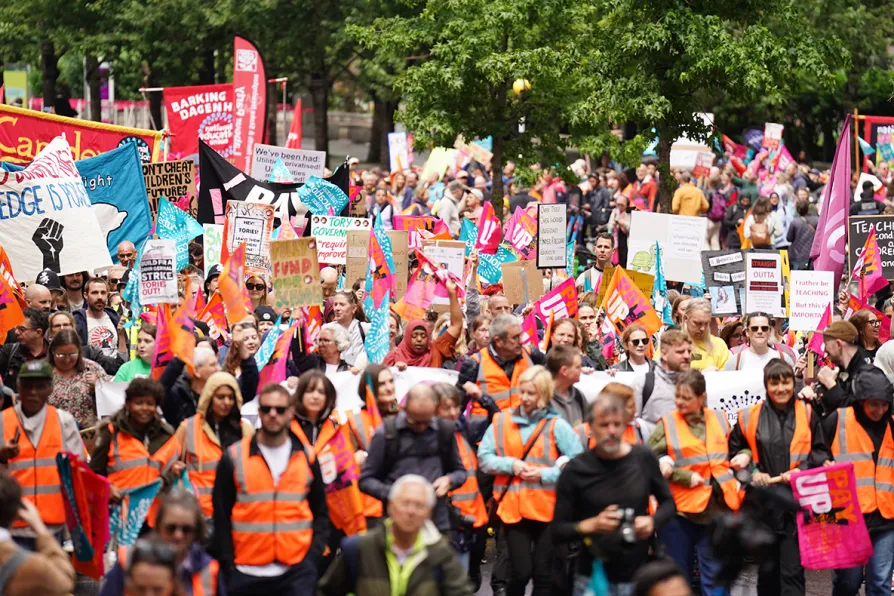
 Members of the National Education Union (NEU) take part in a rally through Westminster to Parliament Square, London, as teachers stage walkouts across England in an ongoing dispute over pay, July 5, 2023
Members of the National Education Union (NEU) take part in a rally through Westminster to Parliament Square, London, as teachers stage walkouts across England in an ongoing dispute over pay, July 5, 2023
TEACHERS in England have voted for industrial action in autumn, their union the NASUWT announced today as Prime Minister Rishi Sunak is yet to make a final decision on public-sector pay.
The government is still considering whether to accept the recommendations of independent pay review bodies to offer millions of workers rises or reject the suggestions on the grounds of affordability.
Independent review bodies have reportedly recommended that teachers should receive a 6.5 per cent pay rise for 2023-24, while police officers, prison officers and junior doctors should all get 6 per cent or more.
Final decisions are expected within days, with multimillionaire Mr Sunak saying that “we all live within budgets” and he had to take a “responsible” approach to the public finances.
Treasury minister Victoria Atkins told ITV’s Good Morning Britain that “no decisions have been made” yet.
Nearly nine out of 10 teachers at the NASUWT voted to strike, with the union planning to stage continuous action short of strike action starting in September in a dispute over pay, workload and long hours.
Dates for strike action in the autumn term will also be considered and it will be co-ordinated with other education unions where possible, the union said.
NASUWT general secretary Dr Patrick Roach said: “Today our members have sent a strong message to the government and employers that teachers demand a better deal on pay and to address excessive workload and working hours.
“Our members have secured the largest mandate for industrial action by the NASUWT in over a decade, exceeding the government’s anti-trade union ballot thresholds.
“We have today written to the government and to employers confirming the prospect for industrial action in schools the length and breadth of the country from this autumn.”
Dr Roach said that members’ goodwill has been “taken for granted for far too long,” adding: “Excessive workload demands have become so debilitating that we have seen record numbers of teachers and headteachers leaving the profession, or reporting anxiety, work-related stress and self-harm because of the pressures of the job.
“No teacher should expect to work in conditions damaging to their health and wellbeing.
“Ministers cannot continue to wring their hands and do nothing.
“If the government won’t take the action needed to end excessive workload and working hours, we will take action in workplaces across the country to protect our members.”
He also hit out at the government for ignoring the “damaging impact” that the teacher recruitment and retention crisis is having on pupils’ education, calling for urgent action to tackle excessive workload and hours and secure real-terms pay restoration.
Dr Roach said the review body’s recommendations is the minimum their members are entitled to and said: “The government is ultimately responsible for teachers’ pay and working conditions and ministers must now get back to the negotiating table to agree a deal that will command the support of our members.”
Schools have seen eight days of walkouts by National Education Union (NEU) members since February, which left the majority of state schools in England closed last week.
The NEU, the NAHT school leaders’ union and the Association of School and College Leaders are balloting their members in England to take action, and their ballots close at the end of this month.
Shadow housing secretary Lisa Nandy refused to say whether a Labour administration would accept the pay review body recommendations in full.
She said: “We haven’t seen them all and we would obviously look at them carefully.
“In the end, it is for governments to decide, though.”

Home Secretary Cooper confirms plans to ban the group and claims its peaceful activists ‘meet the legal threshold under the Terrorism Act 2000’

US president says his nation might join forces with Israel in attacking Iran
















